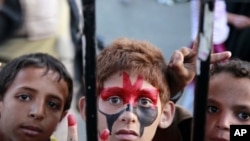Yemen's youth activists are promising to back the country's acting leader, who took over from wounded President Ali Abdullah Saleh while he is in Saudi Arabia for medical treatment. But the protesters' call for democratic change could be drowned out by a variety of competing voices.
Activists mingled with ordinary residents Monday on the streets of Sana'a in a continuing celebration of Saleh's departure.
Vice-President Abd al-Rab Mansur Hadi said on Monday that President Saleh will return to Sana'a "in days" and resume his responsibilities. But protesters, like Amer al-Khamisi, believe this marks the end of the president's nearly 33-year rule.
He says that Saleh is gone and will not come back, adding the president "is in the past" and the oppression is over.
Attack that wounded Saleh
The president was wounded in an attack on the presidential palace Friday, which the government blamed on members of the al-Ahmar clan who battled troops for two weeks in the capital.
In the aftermath, the vice-president and clan leader Sadeq al-Ahmar agreed to pull back their forces, but in scattered violence Monday, at least three more al-Ahmar fighters were killed.
Youth Revolution claims victory
While violence precipitated Saleh's departure, Wassim al-Qorashi, a spokesman for the National Organizing Committee of the Youth Revolution was among those claiming victory for the change under way.
Qorashi said the first stage of the revolution has ended, but his group will continue to struggle until all of their demands are achieved. It's a note of caution about the future that political observers believe is well placed.
"What we are actually seeing in Yemen right now is rivalries between elite factions, rivalries between political actors at the absolute top levels of Yemen's political elite," explained Kate Nevins, who runs the Middle East and North Africa program at Chatham House. "And if the vice president doesn't have the support of one of these factions, it will be a very hard job for him to get everyone of to the negotiating table."
Those factions include Saleh's family, who hold key positions in the nation's security apparatus, members of the al-Ahmar clan, which leads the Hashid tribal federation, rival tribal groups, powerful generals, northern rebels and southern secessionists.
Activists' role
Nevins, of the London-based research center, believes that even against this formidable backdrop, it's possible for pro-democracy activists to play a role in the nation's future.
"We are seeing a very impressive, very organized youth movement come out of the pro-democracy protest and there are leadership figures emerging from this movement," Nevins said. "Now, if Saleh is to not return to Yemen, we have a situation where there might be a move towards a nation unity government."
Not that whoever is to lead Yemen will have an easy job. The youth movement was inspired by popular uprisings elsewhere in the Arab world, but the similarities with Yemen, according to Nevins, quickly end.
"It doesn't have the formal institutions that Tunisia and Egypt have, so whoever comes into power or whichever group comes into power after Saleh will be inheriting a very complex system.," said Nevins. "We're also facing an issue where the economy is collapsing, Yemen is losing its foreign currency reserves. It's running out of fuel. It's running out of water. There's a massive food crisis. And it has some of the highest levels of malnutrition in the world. So there are a lot of problems to be dealt with."
Al-Qaida factor
Yemen also has an active branch of the al-Qaida terror network, which is why neighboring Saudi Arabia and the United States are playing considerable roles both openly and behind-the-scene to find some kind of stability for Yemen at this volatile time.





